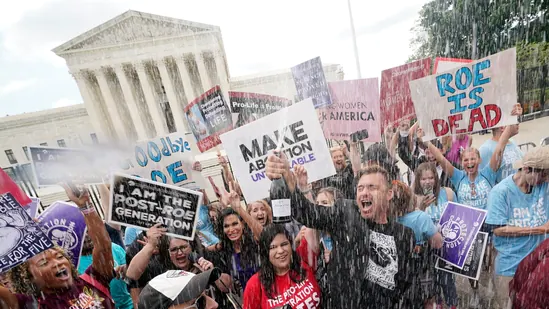The US Supreme Court on Friday ended the right to abortion in a landmark ruling that does away with half-a-century of Constitutional protections on one of the most divisive and bitterly fought issues in American political life.
The conservative-dominated court overturned the landmark 1973 “Roe v Wade” decision that enshrined a woman’s right to an abortion, saying that individual states can now permit or restrict the procedure themselves. “The Constitution does not confer a right to abortion; Roe and Casey are overruled; and the authority to regulate abortion is returned to the people and their elected representatives,” the court said.
In the majority opinion, Justice Samuel Alito said “abortion presents a profound moral issue on which Americans hold sharply conflicting views. The Constitution does not prohibit the citizens of each State from regulating or prohibiting abortion,” he said.
Dissenting were the three liberals on the court. The ruling will likely set into motion a new laws in roughly half of the 50 US states that will severely restrict or outright ban and criminalize abortions, forcing women to travel long distances to states that still permit the procedure.
The opinion shredded the 1973 Roe v. Wade ruling by the nation’s highest court that said women had the right to abortion based on the constitutional right to privacy over their own bodies.
The court’s ruling goes against an international trend of easing abortion laws, including in such countries as Ireland, Argentina, Mexico and Colombia where the Catholic Church continues to wield considerable influence.
Victory for Conservatives:
The ruling, however, represents a victory of 50 years of struggle against abortion by the religious right but the anti-abortion camp is expected to continue to push for an outright nationwide ban. The ruling was made possible by the nomination of three conservative justices to the court by former Republican president Donald Trump — Neil Gorsuch, Kavanaugh and Amy Coney Barrett.
The case before the court was a Mississippi law that would restrict abortion to 15 weeks but during the hearing of the case in December several justices indicated they were prepared to go further.
Women living in states with strict anti-abortion laws will either have to continue with their pregnancy, undergo a clandestine abortion or obtain abortion pills, or travel to another state where the procedure remains legal. Several Democratic-ruled states, anticipating an influx, have taken steps to facilitate abortion and clinics have also shifted their resources.
Also Read: Spain To Become First Western Country To Provide Menstrual Leave













